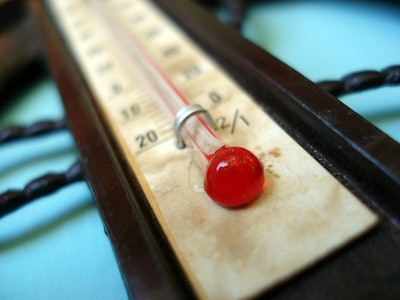
A lack of sweat glands and relatively high body temperatures put poultry, especially fast-growing chickens, at a higher risk of heat stress. This is a concern for farmers, especially as temperatures rise in the northern hemisphere.
The comfortable ambient temperature for poultry is between 18 and 24 ‘C. Above this temperature, birds need to pant to dissipate body heat. Exposure to a combination of high heat and high humidity can cause heat stress, leading to increased morbidity and mortality.
“In response to elevated environmental or metabolic heat, the blood shifts from visceral tissues, including the intestines, to the peripheral tissues,” explained Soheil Varasteh, a pharma-nutrition specialist at Trouw Nutrition. “When the body reacts this way, it reduces blood flow in the intestines, resulting in hypoxia and heat stress.”
One common misperception is that heat stress only affects birds that live in tropical regions. The truth is that heat stress can affect any bird, in any climate.
“Heat stress is a global issue that affects birds in all temperatures. When temperatures rise higher than the birds comfort zone, heat stress can happen,” Varasteh said.
Farm management practices that help
Prevention is key, but there are other things that poultry producers can do to alleviate heat stress in poultry. One way is the use of exhaust fans that ensure air flow ventilation throughout the farm.
Another method that can help are dietary interventions. Certain nutritional interventional strategies and feeding practices can prevent lipid oxidation and mitigate the effects of heat stress.
“Dietary interventions can help reduce metabolic heat. It is very important to have dietary strategies in place to prevent metabolic heat and maintain oxidative balance,” Varasteh said. “But, the best way to deal with heat stress is to implement preventative measures. The symptoms of heat stress can be difficult to recognize, therefore it’s important that farmers think ahead.”
Like what you just read? Sign up now for free to receive the Poultry Future Newsletter.


















